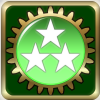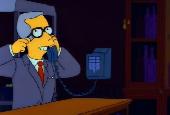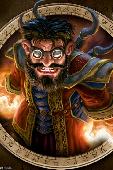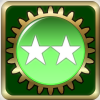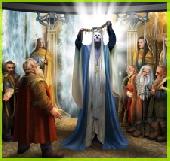-
Mon 3rd Sep 2012 00:26 #1 / 18
Thingol's salient arguments:
"The problem with full fog is the game simply reverts into a luck of guessing and away from a game of skill. I suppose this is good if one feels they are the lesser skilled person."
and
"My point is it becomes almost a complete guessing game to the detriment of skill level. Only a nattering nabob would argue against that point."
I would argue:
The lack of information requires more skill, because the ability to "guess" what the enemy will do while lacking full intel is what historically separates true strategists from simple mathematicians. Not too mention total fog on THIS map does not mean it’s “almost a complete guessing gameâ€.
You know the map layout.
You know the territory values and troop maxes.
You know the starting dispositions and troop strengths of all players
You probably know the most common strategies.
You know the attack/defense ratios
You may even know the opposing player’s tendencies
All of which allows you to make predictions, not just random guesses at what the enemy will do and where they will do it.
Thoughts?
Edited Mon 3rd Sep 00:27 [history]
-
Mon 3rd Sep 2012 00:57 #2 / 18
There's probably a really good way to judge such things, but it seems like a complex question to me.
Consider three variants of Texas Holdem. In variant 1, all cards are face up. Essentially, you bet when you have enough equity and call when you have pot odds. It's a numbers game. In variant 2, no player can see their own cards. This is a true guessing game without any strategy. Variant 3 is the interesting one - you see your own hand but not your opponents' hands.
By analogy, the total fog situation is the one where you see your own hand but not your opponents' hands. I suspect total fog requires more skill, but I suppose there is the possibility that "knowing your own hand" isn't enough information to overcome the guessing luck.
Edited Mon 3rd Sep 00:58 [history]
-
 Mon 3rd Sep 2012 01:37 #3 / 18
"I shall pass this but once, any good I can do, or kindness I can show; let me do it now. Let me not difer nor neglect it, for I shall not pass this way again." -Stephen Grellet
Mon 3rd Sep 2012 01:37 #3 / 18
"I shall pass this but once, any good I can do, or kindness I can show; let me do it now. Let me not difer nor neglect it, for I shall not pass this way again." -Stephen GrelletMaybe separating the two viewpoints is necessary to compare skill levels:
When you can't see what the other player is doing, it's you against what you think they are doing. One strategist against what they think their opponent will do. In a way, you're battling yourself. As opposed to battling what you can see happening.
But there is a second level of complexity to the skill in this game. A big part of winning is knowing how to do good risk management and deal with the ever changing luck factor. The dice play a role, and so does the map. The good players on this site tend to be consistently good at the game, even when the dice are bad, and this is a skill.
To follow up the "overcome the random dice" skill is the ability to position oneself well and make good attacks and defenses, irregardless of what else is happening, or what the otherplayers are doing. I think a really good player can do this like they can mitigate the dice risk, and it starts to not matter weather or not they can see the enemies "current positions".
Maybe it doesn't matter.
-
 Mon 3rd Sep 2012 09:26 #4 / 18
Mon 3rd Sep 2012 09:26 #4 / 18
My opinion is that total fog, in general involves more luck compared to no fog. Although the points you make are true Ratsy I think that time is a more important factor. As the rounds pass your knowledge of starting information and player tendencies becomes less and less valuable. It's like watching a dog run into the woods, you know what direction he went, but if you don't catch him right away there are too many variables to make intelligent decisions where he went.
Without question there are times when the clues you see in a game, when considered in an intelligent fashion, will give a knowledgable player the edge. But I think these situations are the exception.
-
 Mon 3rd Sep 2012 11:16 #5 / 18
Mon 3rd Sep 2012 11:16 #5 / 18
you guys look so upset at each other you wont even post in the same thread :)
http://www.wargear.net/forum/showthread/2627/Aamp;A_with_Total_Fog_-_guessing_game_or_match_of_skill
-
 Mon 3rd Sep 2012 11:16 #6 / 18
It should be possible to play WG boards in real-time ..without the wait, regardless of how many are playing.
Mon 3rd Sep 2012 11:16 #6 / 18
It should be possible to play WG boards in real-time ..without the wait, regardless of how many are playing.I don't see how this debate should be necessarily exclusive to A&A ..or even SimulGear play.
https://sites.google.com/site/m57sengine/home
-
 Mon 3rd Sep 2012 12:36 #7 / 18
Mon 3rd Sep 2012 12:36 #7 / 18
Well, thanks for that M57.
In each game, there is a skiil factor and a luck factor. My argument is that, after a couple of turns (whereby the players have some knowledge of opponent's troop location and strength), the luck factor increases at the expense of skill as you are competely guessing, especially for folks such as myself who are playing natively and don't have the benefit of looking back at the history.
-
 Mon 3rd Sep 2012 21:21 #8 / 18
Mon 3rd Sep 2012 21:21 #8 / 18
I see Squintgnome's point about in general more fog means more luck. But, this is not a random placement, turn taking map. It’s a simul teamplay. No one can move more than one territory of depth without everyone having the opportunity to react and readjust to the change in conditions. While in a few turns your opening knowledge of opponent disposition wanes you become increasingly assured that fog = enemy forces. Plus the troop maximums on all value territories limit many strategic alternatives to a predictable set of options.
In my current experience (which is limited) it appears to be adding complexity. I’m taking longer and conferring more with teammates to think through and make decisions that I would have made previously with a quick math calculation. As a result we are specifically making choices to take advantage of the lack of information, using infiltration tactics. Intentionally avoiding suspected enemy troop concentrations, deploying 1-5 troop scouting elements to seek out weaknesses in our opponent’s lines, and forcing them into less optimal options, etc. It is clearly rewarding risk taking and initiative, but is that the same as “luckâ€. At what point is luck not luck but greater strategy/predictive ability?
It seems pretty clear that someone who simply crunches the numbers is going to be at a disadvantage, but given those parameters is a “less skilled†player really at an advantage in that situation?
-
 Mon 3rd Sep 2012 22:22 #9 / 18
Mon 3rd Sep 2012 22:22 #9 / 18
M57 wrote:
I don't see how this debate should be necessarily exclusive to A&A ..or even SimulGear play.
It isn't, but clearly the most interested parties for this specific question are those crazy A&A players. I don't know A&A well enough to comment, but itsnotatumor is saying all of the things I would say in asserting that fog adds skill. So, I'm guessing he's right ;)
For the general question, there are maps where fog is crucial, absolutely essential for the game to have ANY complexity at all. For other maps, fog isn't necessary, but makes it more complicated. But there are a few where I don't think it does. In other words, the situation is different for each map.
-
 Mon 3rd Sep 2012 23:07 #10 / 18
Mon 3rd Sep 2012 23:07 #10 / 18
Crazy A&Aers? You should be one too, Hugh. ;)
If it were "light" fog, yes, I would agree. What we're talking about here is total fog (cannot see ownership, even neutrals).
On some boards (such as perhaps Maze), total fog works. On A&A, this is a nightmare.Edited Mon 3rd Sep 23:08 [history]
-
 Mon 3rd Sep 2012 23:18 #11 / 18
Mon 3rd Sep 2012 23:18 #11 / 18
One person's nightmare... =D
-
 Mon 3rd Sep 2012 23:23 #12 / 18
Mon 3rd Sep 2012 23:23 #12 / 18
Thingol wrote: Crazy A&Aers? You should be one too, Hugh. ;)
If it were "light" fog, yes, I would agree. What we're talking about here is total fog (cannot see ownership, even neutrals).
On some boards (such as perhaps Maze), total fog works. On A&A, this is a nightmare.Yeah yeah yeah - I knew the discussion was about total fog, I was just talking in general terms. As far as my general assertion, we probably agree: It depends on the map. But, I'm curious about this A&A situation, so I hope you all continue to argue passionately. I mean, you kind of do have a lot of information. It's essentially 1 team v 1 team, so... You know _where_ the opponent is.
Edited Mon 3rd Sep 23:24 [history]
-
 Tue 4th Sep 2012 01:10 #13 / 18
Tue 4th Sep 2012 01:10 #13 / 18
Ah...not. The Allies have a lot more of the map. We know the basic initial setup and can sort of guage where they allocated troops on turn 1 and vaguely on turn 2. After that, it's a pure crapshoot...hence the luck argument.
In online risk, the only thing to measure in regards to skill is the intelligence with which decisions are made. The basis for intelligent decisions is knowledge. To strip away knowledge and make it a guessing game is to interject a higher percentage of chance into the game. By definition, a game with a higher chance quotient is one in which the skill level.
-
 Tue 4th Sep 2012 14:50 #14 / 18
Tue 4th Sep 2012 14:50 #14 / 18
Thingol wrote:
In online risk, the only thing to measure in regards to skill is the intelligence with which decisions are made. The basis for intelligent decisions is knowledge. To strip away knowledge and make it a guessing game is to interject a higher percentage of chance into the game. By definition, a game with a higher chance quotient is one in which the skill level.Specifically, you are probably right regarding A&A, because I know you play it a lot. (I haven't played it much, with or without total fog, so really I have no frame of reference here, like a child wandering into a movie...)
But, you are conveniently defining skill. "By definition, a game with a higher chance quotient is one in which the skill level." (I suspect the sentence ends "is lower", but maybe you don't mean that.)
I accept a definition of skill in terms of difficulty of decision, but not one in which a greater influence of chance necessitates lower skill. Clearly backgammon is much harder than tic-tac-toe.
I feel like your argument would imply that poker should be played with all the cards face up. That maximizes the information available to all players. The portion of luck assigned to not knowing your opponents' cards is eliminated. To strip away that knowledge and make it a guessing game clearly makes the decisions easier, right? No! The whole notion of using a bet to gain information or to deceive an opponent doesn't exist when there's too much information. (This cards-up situation is analyzed in some books, and rightly denounced as an exercise in mere calculation.)
-
 Tue 4th Sep 2012 17:42 #15 / 18
Tue 4th Sep 2012 17:42 #15 / 18
Yes, the end of my sentence somehow got stripped away. It should have been as follows:
By definition, a game with a higher chance quotient is one in which the skill level weighting is reduced. In other words, a higher skilled (read: knowledgeable) player has a lower probability of winning the game due to, pardon the pun, blind luck.
There are some games, such as poker, where the blindness of the opponent's hand is part of the fun. I don't believe A&A is such a game and I would bet the house that almost all experienced (read: hard-core) A&Aers would feel likewise.
Edited Tue 4th Sep 17:43 [history]
-
 Tue 4th Sep 2012 18:19 #16 / 18
Tue 4th Sep 2012 18:19 #16 / 18
As noted above, I am in agreement with Thingol on this one. However, one subtle point I want to discuss is what Ratsy was speaking about earlier. I think there are different types of skills players possess. To simplify, lets say one involves tactics (where and when to attack with how much) and one involves prediction (taking an informed guess as to what your opponent will do).
Either type of game, fog or non-fog, requires both skills. However, fogged games rely much more heavily on prediction, which in its worst form can be referred to as guessing. From my experience, prediction does not have as reliable an impact as solid tactics. For example, if you need to determine which territory out of two will be ripe for attack next turn (without any obvious clues) you will have a 50 / 50 chance. Someone who is very skilled at prediction may only raise that to 65 / 35 which is not as good a payback as excellent tactics. So, I get a feel that fogged games, although they may benefit from good prediction skills don't feel as rewarding somehow - sort of like being an Indy race car driver behind the wheel of a Pinto, no matter how great you drive your skills aren't transferred into results.
Not sure if I am expressing my thoughts well enough....let's hear what others have to say.
-
 Tue 4th Sep 2012 18:29 #17 / 18
Tue 4th Sep 2012 18:29 #17 / 18
Very well put SG.
Edited Tue 4th Sep 18:29 [history]
-
 Fri 7th Sep 2012 00:06 #18 / 18
Fri 7th Sep 2012 00:06 #18 / 18
I didn’t quite follow your argument Squintgnome. You define tactics as “where and when to attack with how much)â€, but in your example you then label the same action prediction.
Isn’t prediction the essential element of tactics? Isn’t “predicting" the best targets, “predicting†your biggest weakness, and assigning your resources accordingly the essence of “solid tactics†Tactics without prediction is simply mathematics. The original question was does it take more or less skill to make those predictions, allocate your resources, and apply “solid tactics†when you are lacking information about your opponent.
Is it easier to make those choices when you know exactly your opponents strength and disposition? Of course. At that point it becomes a mathematical exercise. So, conversely making the same decisions lacking that information is tougher i.e. requires more skill. Exactly as Hugh already argued with his poker analogy and no one has yet refuted.
Based on the last couple posts I’m also wondering if we are now confusing intelligence/skill with personal preference, and manufacturing arguments to support that preference… Thoughts?
